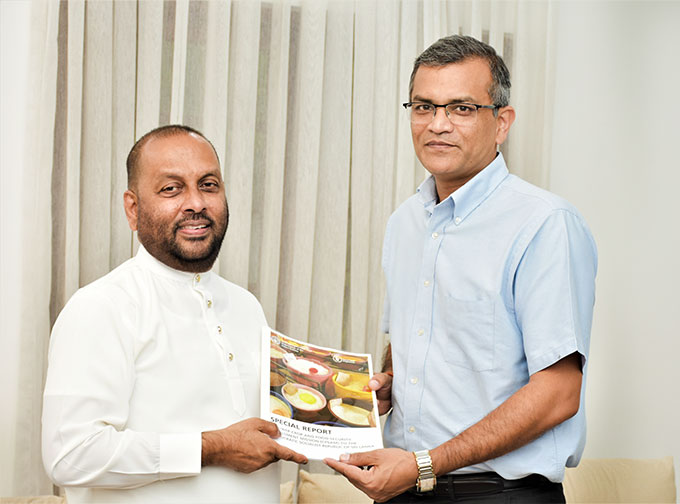Nepal Policy
India’s relationship with Nepal has always been complex, shaped by historical, cultural, and geographical factors.
Close on the heels of Agriculture Minister Mahinda Amaraweera’s admission that the government lacked the wherewithal to purchase paddy, the Food and Agriculture Organization (FAO) of the United Nations and its World Food Programme (WFP) has, in a joint report released yesterday (12), revealed that 6.3 mn people are facing moderate to severe acute food insecurity.

Minister Amaraweera receiving the joint FAO-WFP report from FAO Representative for Sri Lanka and the Maldives, Vimlendra Sharan
Close on the heels of Agriculture Minister Mahinda Amaraweera’s admission that the government lacked the wherewithal to purchase paddy, the Food and Agriculture Organization (FAO) of the United Nations and its World Food Programme (WFP) has, in a joint report released yesterday (12), revealed that 6.3 mn people are facing moderate to severe acute food insecurity.
The report released in Rome and Colombo simultaneously warn that the situation is expected to worsen unless adequate life-saving assistance and livelihood support are provided.
Advertisement
UN agencies have said two consecutive seasons of poor harvests, which led to a nearly 50 percent drop in agricultural production, and reduced imports of food grains due to foreign exchange constraints have caused the present situation.
Advertisement
The joint FAO-WFP Crop and Food Security Assessment Mission (CFSAM) noted that immediate food assistance and livelihood programmes, including through existing social assistance mechanisms, are critical to enable households to access nutritious food, particularly moderately and severely acute food insecure ones.
Without assistance, the food security situation is expected to deteriorate further, particularly during the October 2022 to February 2023 lean season, driven by poor harvests of staple foods, in particular rice, and the ongoing economic crisis.
“In order to avert a further deterioration of food security conditions and to support restoration of agricultural production, livelihood assistance targeting smallholder farmers should remain a priority,” said FAO Representative in Sri Lanka Vimlendra Sharan. “With around 30 percent of the population depending on agriculture, improving the production capacity of farmers will ultimately boost the resilience of the agricultural sector, reduce import requirements amid shortages of foreign currency reserves and avert the rise in hunger.”
“Months into this crippling economic crisis, families are running out of options – they are exhausted. More than 60 percent of families are eating less, and eating cheaper, less nutritious food. This comes at a time when financial constraints have forced the government to scale back on nutrition programmes, such as school meals and fortified food to mothers and undernourished children.
WFP’s top priority is to provide immediate food and nutrition assistance to the most at-risk communities to prevent a further deterioration of their nutrition,” said WFP Representative and Country Director in Sri Lanka, Abdur Rahim Siddiqui.
At the request of the Government, the joint Crop and Food Security Assessment Mission visited all 25 districts in the country between June and July 2022 to analyze agricultural production levels in 2022, particularly of main staple cereals, as well as to assess household food security conditions.
Advertisement